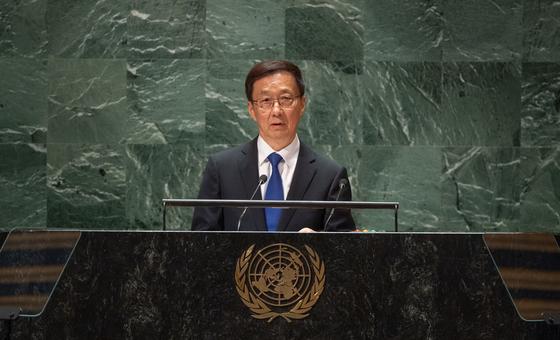“China is firm in supporting the international system with the UN at its core,” and opposes hegemony, power politics, unilateralism, and a Cold War mentality, Han Zheng reiterated.
He stressed that China “will never practise hegemony,” and that “a small number of countries have arbitrarily imposed illegal and unilateral sanctions,” severely undermining the harmony and stability of international relations. Mr. Han encouraged the international community to jointly resist such acts. He emphasized that China “will never practice hegemony.”
Mr. Han also highlighted China’s status as the only permanent member of the UN Security Council to pledge no first use of nuclear weapons and called for the maintenance of security in both traditional and non-traditional domains.
Conflict in Ukraine
Mr. Han outlined China’s desire for peace in Ukraine, arguing states had the obligation to respect the sovereignty and territorial claims of all other states. He stated that ceasing hostilities and resuming peace talks were the only way to settle the ongoing crisis.
“Communication and dialogue are an important way to achieve international security cooperation,” he said.
“China supports all efforts that are conducive to the peaceful resolution of the Ukraine crisis and stands ready to continue playing a constructive role for the early attainment of peace,” he added.
Turning closer to home, he emphasized that there is only one China in the world represented by the government of the People’s Republic of China.
“Taiwan has been an inalienable part of China’s territory since ancient times,” he stressed, and “realizing China’s complete reunification is a shared aspiration,” and his Government will “continue to strive for peaceful reunification with the greatest sincerity and utmost effort”.
Member of Global South
Stressing China’s position as a developing country, Mr. Han reiterated that development should be at the centre of the international agenda, with “win-win outcomes” that should reach every country and individual in a fairer way.
Marking the tenth anniversary of China’s Belt and Road Initiative, Mr. Han cited over 3,000 cooperation projects and 16,000 freight services on the China-Europe Railway Express last year as examples of the initiative’s success.
Furthermore, Vice-President Han said China will remain a developing country and “natural member of the Global South,” firm in upholding their legitimate rights and interests. He reiterated China’s opposition to politicization and double standards, particularly the use of human rights and democracy as a political tool to interfere in other countries.
Climate action
Mr. Went on to emphasize how climate change and its disproportionate impact on developing countries exacerbates development gaps between low and high-income countries and obstructs effective international cooperation.
He reiterated the need to fully implement the Paris Agreement, to stop building any new coal-fired power projects abroad, and to vigorously support developing countries to build more green energy projects. He called on developed countries to do more to reduce emissions and provide developing countries with financing, technology, and capacity-building support.
“Developed countries should do more to reduce emissions and provide developing countries with financing, technology, and capacity-building support,” said Mr. Han.
“China will continue to pursue ecological conservation on a priority basis, advance green and low-carbon development, stop building any new coal-fired power projects abroad, vigorously support other developing countries in developing green and low-carbon energy and help them build more green energy projects.”
Through Chinese modernization and rejuvenation, the country seeks to achieve harmony between humanity and nature while promoting ethical material advancement, said Mr. Han.

